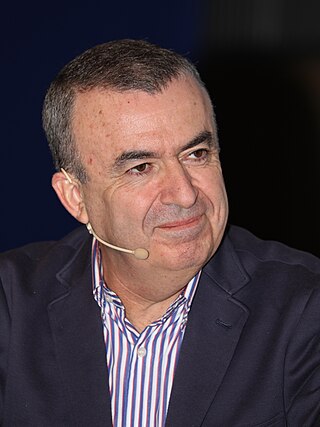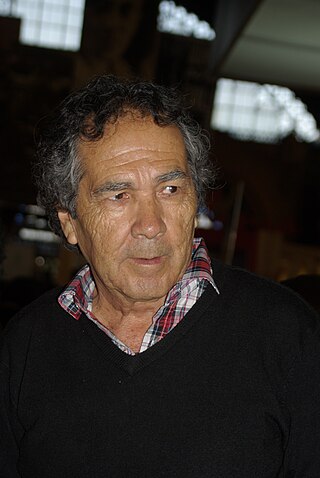Biography
Socorro Venegas was born in San Luis Potosí in 1972. She currently lives in Cuernavaca.
Her short story collection Todas las islas was the winner of the 2002 Premio Nacional de Poesía y Cuento "Benemérito de América."
In 2004, her first novel, Será negra y blanca, won the Premio Nacional de Novela Ópera Prima "Carlos Fuentes."
Her stories have appeared in various anthologies, including Nuevas voces de la narrativa mexicana (2003) and Los mejores cuentos mexicanos 2004 (The Best Mexican Short Stories 2004).
Translations of her stories have appeared in Concho River Review, The Modern Review, Literal, and The Listening Eye, among other publications.

José María Merino is a Spanish novelist born in A Coruña, Galicia on 5 March 1941. He is the father of two daughters, María and Ana, both of them university professors. He lived for several years in León and currently lives in Madrid. Best known for his novels and short stories, he is also a poet and a travel writer.
Gloria Guardia was a Panamanian novelist, essayist and journalist whose works received recognition in Latin America, Europe, Australia and Japan. She was a Fellow at the Panamanian Academy of Letters and Associate Fellow at the Spanish Royal Academy, the Colombian and the Nicaraguan Academy of Letters

Julieta Serrano Romero is a Spanish theatre and cinema actress. Her prolific career began in the 1960s, and she has worked with directors Pedro Almodóvar and Ventura Pons.
Estrella del Valle is a Mexican poet. She was born in Córdoba, Veracruz, in 1971 and studied creative writing at the Writer's General Society of Mexico.

Lorenzo Manuel Silva Amador is a Spanish award-winning writer. After earning a law degree at the Universidad Complutense of Madrid, he worked as a lawyer from 1992 to 2002.

Hernán Rivera Letelier is a Chilean novelist. Until the age of 11 he lived in the Algorta saltpeter mining town, in the north of Chile. When it was closed down, he and his family moved to Antofagasta, where his mother died. His siblings went to live with his aunts. He stayed in Antofagasta, alone, until he was about 11. To survive, he sold newspapers. Later he worked as a messenger for Anglo Lautaro Nirate Company, until his thirst for adventure led him to spend three years traveling in Chile, Bolivia, Perú, Ecuador and Argentina. He returned to Antofagasta in 1973 and began to work at another company, Mantos Blancos. He married a 17-year-old girl when he was 24. Later he left for Pedro de Valdivia, another saltpeter mining town. He completed his seventh and eighth years of study at night school, and at the Inacap educational institute he earned his license as a secondary education instructor. Today he lives in Antofagasta with his wife and four children. He has received the Premio Consejo Nacional de Libro twice, in 1994 and 1996. His novel El arte de la resurrección won the Premio Alfaguara de Novela in Spain in 2010.

Susana Calandrelli was an Argentine writer and teacher.
Consuelo Hernández is a Colombian American poet, scholar, literary critic and associate professor of Latin American studies at American University since 1995.

Juan Carlos Chirinos García is a Venezuelan writer and creative writing teacher. He is a novelist, story writer and biographer. Since 2023, he is corresponding member of the Academia Venezolana de la Lengua.

Maria Teresa Andruetto is an Argentine writer. She has written poems, novels, drama and children's books. For her "lasting contribution to children's literature" she received the biennial Hans Christian Andersen Medal in 2012.
Antón Arrufat Mrad was a Cuban dramatist, novelist, short story writer, poet and essayist.
Patricia Esteban Erlés is a Spanish secondary school teacher, journalist for the Heraldo de Aragón and a short story writer. She studied Spanish language and literature at the University of Zaragoza. She has won a number of major awards and her work has been included in several anthologies. Her stories have been praised by literary critic Rachel Rees for their “biting wit”.

José Miguel Vilar-Bou is a contemporary Spanish novelist, short story writer, and journalist, specializing in horror fiction, science-fiction and fantasy. His work has been awarded with several prizes in literary competitions. His novel Alarido de Dios [The Cry of God] was a finalist for the Awards Celsius 2010 and his short story "El laberinto de la araña" ["The Spider's Labyrinth"] received in the same year the Nocte Award for the best Spanish horror story. In the Spanish Historia natural de los cuentos de miedo [Natural History of the Weird Tales], because of the "expeditious and accurate in its proposal", critic José L. Fernández Arellano mentioned this author's story "La luz encendida" as leading among the young writers' of the genre of horror in Spain.

Camilo Venegas Yero is a Cuban writer and journalist. Since 2000, he has lived in Santo Domingo, Dominican Republic.

Mónica Lavín is a Mexican author of six books of short stories, notable among them Ruby Tuesday no ha muerto ; Uno no sabe ; and her most recent collection, La corredora de Cuemanco y el aficionado a Schubert. In addition she was awarded the Elena Poniatowska Ibero-American Novel Prize for her work Yo, la peor (2010). Her novel Cuando te hablen de amor (2017) was a finalist for the 2019 Mario Vargas Llosa Biennial Prize for the Novel. She is a member of the Sistema Nacional de Creadores (FONCA), was a teacher for the SOGEM Writers’ School, and is currently a professor in the Creative Writing Department of the Universidad Autónoma de la Ciudad de México in México City.
Marco Tulio Aguilera Garramuño is a Colombian novelist, critic and journalist. Born in Bogota, he studied philosophy at the Universidad del Valle and literature at the University of Kansas. Since then, he has lived in Costa Rica and México, where he has taught at the Universidad Veracruzana.
Rubén Bareiro Saguier was a Paraguayan writer, poet and diplomat.
Ana Teresa Torres is a Venezuelan novelist, essayist and short story writer. Her writing, both fiction and non-fiction, is often concerned with Venezuelan history and politics, memory, gender, and psychoanalysis.
Vicente Muñoz Puelles is a Spanish author and translator. He has published over 240 books, including over 180 for children and young adults, as well as almost 500 articles on literary criticism and fiction.

Octavio Escobar Giraldo is a Colombian physician and writer. He won the International Short Novel Award Ciudad de Barbastro XLV (2014) and the National Award for Best Novel from the (Colombian) Ministry of Culture (2016) for Después y antes de Dios. His narrative style is substantially influenced by television, music, cinema because, as he himself states, he went more to the movies than to class. He is the Director of the Manizales Book Fair, which he founded in 2009. He is a professor at the graduate school of Fine Arts and Humanities at the University of Caldas, located in the city where he was born, Manizales, Colombia. His trio of noir novels take on difficult social themes pertaining to the violence, the paramilitaries, and the false positives scandal, the over six thousand young people who were kidnapped and murdered by the Colombian military to meet quotas in the war against the guerrilla forces in the Colombian coffee growing axis, the mountainous region where the author was born and has spent his life.










